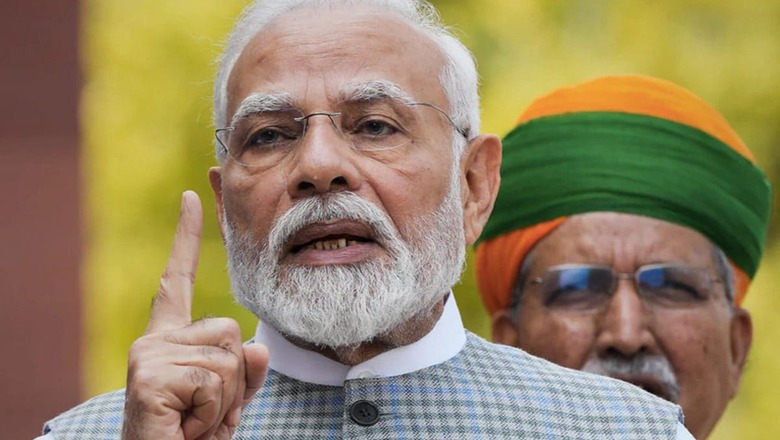
views
If you are an island, it is easy to feel that no one is watching you and no arm can reach you. An increasingly Islamised Maldives society and its new, pro-China government kept regaling in that misplaced feeling of insulation.
But its closest neighbour, Bharat, has been watching it all this while. Several politicians in Malé, including the current President Mohamed Muizzu of the People’s National Congress (PNC), centred their campaigns on India hate. They sported red T-shirts with ‘Go Back India’ and ‘India Out’ written on them.
Soon after coming to power, Muizzu’s government asked India to withdraw the 77 military personnel who operate two helicopters and an aircraft provided by India to the Maldives National Defence Force (MNDF) for emergency medical evacuations and disaster relief operations.
India agreed.
But sensing China’s hand in Maldives’ increasingly hostile stance, the Narendra Modi government started putting in place a quiet counter-operation. And what started unfolding was an extremely unconventional, disruptive and effective diplomatic offensive.
Prime Minister Narendra Modi went for a snorkelling expedition to promote tourism in Lakshadweep, a string of Indian islands just 750 km away from Maldives, just as pretty and more pristine.
A few Indian social media accounts started tweeting that Lakshadweep could outdo the Maldives in tourism if developed well.
Anti-India Islamists in the Maldives government took the bait. They responded to these unofficial Indian accounts with bigotry and vitriol. Mariyam Shiuna, deputy minister for youth empowerment, information and art, called PM Modi a “clown” and a “puppet of Israel”.
Zahid Rameez, a council member of the ruling Progressive Party of Maldives (PPM), said Indians would leave a “permanent smell in the rooms”. Other such insults followed from official Maldives accounts.
No Indian minister or official uttered a word.
Instead, what followed was the unleashing of Bharat’s people power. #BoycottMaldives started trending. Indians started posting screen grabs of booking cancellations to the island and urging others to do the same. At 12 per cent, Indians form the largest group of tourists to Maldives.
Celebrity power followed. Sports heroes Sachin Tendulkar to Mahendra Singh Dhoni started promoting Lakshadweep and other local tourist spots, and actors Akshay Kumar to Salman Khan snubbed Maldives for its insolent behaviour.
EaseMyTrip, which has an 8.1 per cent market share of Indian online travel bookings, suspended all bookings to Maldives. Bigger players like MakeMyTrip may follow.
Lakshadweep administrator Praful Patel announced the government of India’s plans to turn the Agatti airport into a world-class facility. During his visit to Kavaratti island, PM Modi inaugurated projects worth Rs 1,200 crore.
Without speaking a word against the Maldives rants, the Modi establishment put incredible pressure on its government, made not just a billion Indians but also the world dig into the failings in Maldives’ hospitality including women’s safety, alerted ordinary Maldives citizens to the dangers of being hostile to an India which has always promptly and unconditionally sent aid, and created a groundswell of interest in Lakshadweep’s tourism potential.
Over the years, by sensitising Indians to affronts to the nation, Modi has built a parallel and immensely powerful tool of diplomacy: people’s power. Almost 15 years ago, when asked by Rajat Gupta on his show Aap Ki Adalat about international pressure, Modi expressed with clarity what would later be one of the cornerstones of his foreign policy. He said: “Today, Bharat has the strength to produce international pressure. We are a nation of 100 crore. Purey duniya mein pressure hum paida kar saktey hain, ji (we can create pressure on the entire world).”
Whether it is bringing pressure on Justin Trudeau or the Joe Biden administration on callous accusations about India carrying out assassinations on foreign soil, to standing with Israel against Hamas terror, to pushing India’s interest in Ukraine, Europe or Africa, the might of India’s public opinion has been felt across the globe.
That is the invisible arm of India’s diplomacy which amateur politicians of Maldives did not account for before shooting from their keypads.
Abhijit Majumder is a senior journalist. Views expressed in the above piece are personal and solely that of the author. They do not necessarily reflect News18’s views.


















Comments
0 comment